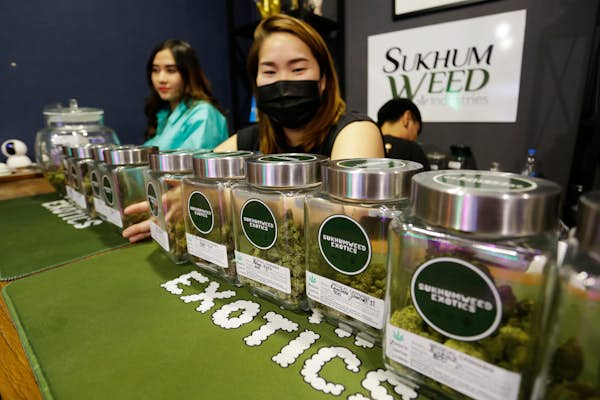Cannabis is legal in Thailand, but it's complicated: what travelers need to know
Thailand is now in the weed game but it's not all green: an expert's guide to the new cannabis rules.

Thailand, not long ago a country with some of the strictest drug policies in the world, is getting into the weed game. Although this moment already seems to be short-lived.
Medical cannabis was legalized in Thailand in 2018, making it the first country in Asia to approve marijuana for medicinal and industrial use. By 2022, Thailand’s Food and Drug Administration had removed marijuana and hemp from the Category 5 narcotics list, meaning that these substances became decriminalized. And aside from restrictions on those under 20 and pregnant and breastfeeding mothers, everyone could grow, smoke, consume, sell and buy cannabis without any retribution.
However, the current Thai law states that extracted cannabis content must contain less than 0.2% THC – generally considered a very small amount of the stuff that gets you high. Yet decriminalization has allowed a free pass to unlicensed vendors, with thousands of entrepreneurial Thais openly selling weed products that far exceeded the government’s THC limit.
Even now, Bangkok’s Khao San Road is packed with streetside tables that are groaning under the weight of piles of buds that far exceed the legal THC cap. In Chiang Mai, tourists happily sip on high-octane marijuana-laced cocktails. Somewhere on a Thai island, bongs are being ripped in public.
Until now, a status quo has been maintained. High-THC weed is openly sold as Thais take full advantage of this legal gray area, and the police and authorities are unable to enforce any potency rules. However, a new government elected on the back of promised policies has announced a fixed plan to end this freewheeling phase with a new bill that will heavily regulate it once again.
So what does this mean for tourists who have enjoyed, or are looking to enjoy the green herb on their next visit?
Outdoor cannabis event in Nakhon Pathom © MrWinn / ShutterstockThe legality and laws around THC are rather confusing and can change without warning
Despite its decriminalization, the Thai government remains uncomfortable with people smoking marijuana in public. In an effort to curb this, authorities revert to the 1992 Public Health Act, which prohibits any “act of public disturbance” resulting from smoke and/or smell. Violators of this law can face a 25,000 baht (around US$690) fine and three months in prison.
The Public Health Minister who passed the bill once stated to English-speaking reporters that it’s wisest for visitors to Thailand to keep their recreational marijuana use on the down low, meaning, quite simply, don’t do it in public and there shouldn’t be an issue. For now, this is still the case.
The new draft bill (set to be passed in late 2024, published on the health ministry's website) is set to change this, allowing only medical and health uses of cannabis, while outlawing all types of recreational use. Import, export, cultivation and commercial use of cannabis will also require permits.
Fines for recreational use are set at 60,000 baht ($1,700). Still, at the time of writing, there are no clarifications on what defines “recreational” and the current bill doesn't mention the need for a prescription or legal document defining “medical and health use exception”.
Marijuana buds on display in a cannabis pop-up truck at the iconic Khaosan Road, Bangkok © Nelson Antoine / ShutterstockSo what does that mean for a tourist looking to enjoy legal weed?
Our advice is to follow updates online closely as rules could change at a moment’s notice – leaving even the most innocent tourist vulnerable to fines, arrests or worse.
Yet even after the cannabis regulation bill passes, it’s likely the plant will still exist in a gray area. The massive $1.2 billion weed industry is not going to disappear overnight and although the multitude of shops may rebrand as “natural pharmacists”, the current bill has little in the way of defining what constitutes health vs recreation.
That being said, a lot could change in a few months – the bill could become stronger or it may be tabled. The government has also promised businesses time to adjust to the new regulation – this should logically extend to their patrons too.
If you’re visiting Thailand and require low-level THC or CBD cannabis for medicinal use, you can seek out a prescription at one of a network of approved hospitals and clinics that are expected to continue to operate after the new legalization status takes effect.
When it does, you may still be able to enjoy it as always or you may not. As with any controlled substance in Southeast Asia, it’s best to proceed with caution and stay up-to-date whenever possible.
Outdoor cannabis event in Nakhon Pathom, Thailand © MrWinn / ShutterstockEating and drinking marijuana
The current law states that food and beverage products that contain cannabis – again, those strictly for medical purposes – must contain less than 0.2% THC, although on the streets of Thailand, these rules are being flouted.
An array of food and beverage businesses have taken advantage of decriminalization by offering cannabis-laced food items and drinks in recent years. One company has debuted a cannabis-infused fish sauce while drinks with marijuana-derived ingredients are already for sale at the country’s convenience stores. Yet a recent study by Thailand’s top university found that 30% of these products exceed the government’s THC cap.
Can I bring my own cannabis products to Thailand now?
No. According to the guidelines set out by the Tourism Authority of Thailand, products containing cannabis and hemp extracts, and hemp-derived products, as well as any parts of cannabis and hemp with more than 0.2% THC still fall under the Category 5 Narcotics list. Meaning that you run a very high risk by bringing your favorite gummies into Thailand.
However, until this new bill is passed, it's still legal to carry marijuana on your person, public transport and even internal flights as confirmed by the Airports of Thailand Authority (AOT).



















